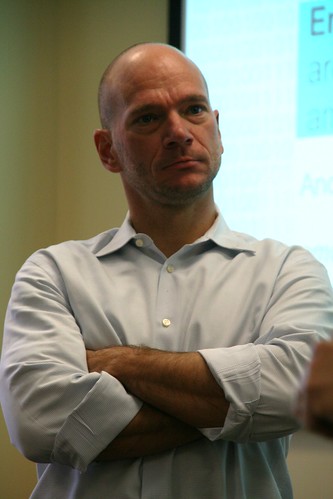Social networking in enterprises
 Andrew McAfee of HBS was the speaker at today’s Berkman luncheon series, talking about Enterprise 2.0, which he explains as being the phenomenon in which companies incorporate “community” features into their work. He said that based on connectivity, people’s networks can be categorized into strong ties, weak ties, potential ties, no ties. Citing Mark Granovetter, he said that weak ties may be stronger because people that are strong ties will not provide anything you don’t already know. (Interesting fact: Partners and future jobs are usually found through weak ties!) He said that corporate technologies do lousy jobs of connecting weak/potential ties, which could be done through social networking tools. [One thing that he grazed over was the value of people who convert ties into actual networks, which caught my attention because I fall into that category.]
Andrew McAfee of HBS was the speaker at today’s Berkman luncheon series, talking about Enterprise 2.0, which he explains as being the phenomenon in which companies incorporate “community” features into their work. He said that based on connectivity, people’s networks can be categorized into strong ties, weak ties, potential ties, no ties. Citing Mark Granovetter, he said that weak ties may be stronger because people that are strong ties will not provide anything you don’t already know. (Interesting fact: Partners and future jobs are usually found through weak ties!) He said that corporate technologies do lousy jobs of connecting weak/potential ties, which could be done through social networking tools. [One thing that he grazed over was the value of people who convert ties into actual networks, which caught my attention because I fall into that category.]
He also talked about prediction markets (which fall into the “no ties” category) and how election trends were reflected in the Iowa Electronic Markets, which people seemed to be more interested in than his talk about implementing social networking tools in companies.
He gave a fairly standard argument, although he seemed to be an extreme optimist in terms of what in-house networking could do. Although I agree that in-house social networking can build a more positive corporate (social) culture and perhaps enhance productivity to some level, I believe that only those companies that strongly control this “sharing” actually see financial benefits. Also, the more successful in-house networking that I’ve seen were in companies that built their own programs versus companies who bought tweakable solutions because features had to be continuously updated to meet increasing demands. Obviously, this was expensive, and it only worked for companies that had strong financial incentives in sharing confidential data.
One point I found very disturbing was his comment on how Twitter and Facebook can be used to exploit weak networks. I really hate people who do this; especially those who are obviously digital narcissists trying to show off. Even worse are people who use 2.0 technology for 1.0 activities, in other words, those who seek feedback but never give others feedback. If people who are really “important” don’t have the time or don’t want to make the effort of replying to others, it means that all the feedback you get is from “unimportant” people. Of course, I suppose that doesn’t matter when you’re seeking advice like whether you should eat dimsum or tacos for lunch.
As always, David Weinberger live-blogged the whole session. Guess which was my question during the Q&A!